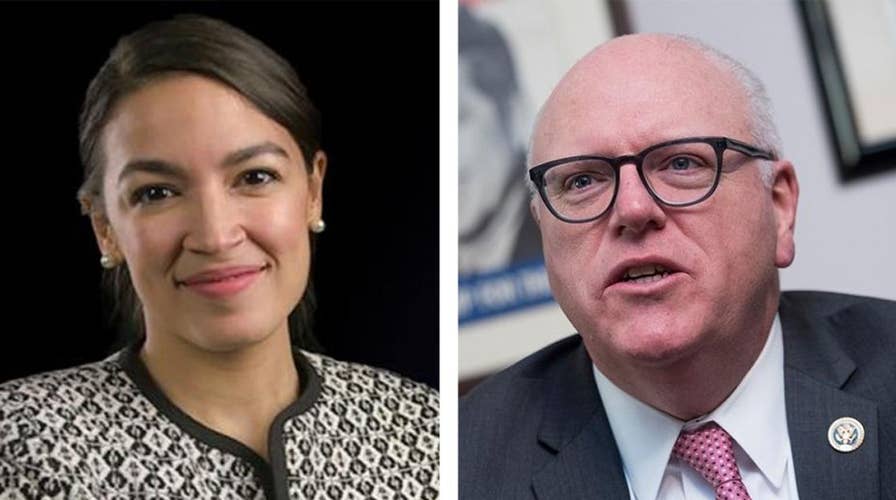Rep. Joe Crowley upset by 28-year-old socialist
Alexandria Ocasio-Cortez takes down the chairman of the House Democratic Caucus in a stunning primary result; reaction and analysis on 'Fox News @ Night' from Mark Penn, former pollster and adviser to President Clinton, and Derek Hunter, contributing editor at The Daily Caller.
Four years ago this month, voters in suburban Richmond, Virginia sent tremors through the Republican establishment by selecting an unknown primary challenger to defeat Eric Cantor, the third-ranking GOP leader in the House.
A year later, House Speaker John Boehner, R-Ohio, was forced from office. And the year after that Donald Trump created an earthquake by winning the GOP presidential nomination.
Will Tuesday’s shocking defeat of Rep. Joe Crowley, the fourth-ranking House Democrat, in a primary in New York City’s outer boroughs signal a similar future earthquake in his party?
Crowley was a 20-year incumbent and a major power broker in New York politics who simultaneously ran the Queens Democratic Party. He was widely viewed as a likely successor to House Democratic Leader Nancy Pelosi of California.
Ocasio-Chavez’s victory in the Democratic primary is the first tangible sign that the passions that brought Sen. Bernie Sanders, I-Vt., to within a few primary victories of beating Hillary Clinton for the 2016 Democratic presidential nomination are still flowing.
But Crowley failed to keep up with demographic changes in his district (now 70 percent non-white) and his party’s leftward lurch. On Tuesday the 56-year-old incumbent lost to first-time candidate Alexandria Ocasio-Cortez, a 28-year-old socialist and former aide to the late Sen. Ted Kennedy, D-Mass.
Crowley spent over $3 million in his failed effort to keep his seat, swamping Ocasio-Cortez’s $300,000 in small donations.
But while Crowley had the cash, Ocasio-Cortez had the issues. She backed a Medicare-for-all bill, free college tuition at public universities, a federal job guarantee and most spectacularly the abolition of the U.S. Immigration and Customs Enforcement (ICE) agency. Crowley’s district is over half immigrant, and ICE border enforcement has rubbed many Democrats there the wrong way.
Crowley desperately tried to play left-wing catchup in the primary. He endorsed Medicare-for-all, called ICE “fascistic” while declining to call for its abolition, and touted the female and minority candidates he had promoted as chair of the Queens Democrats.
Ocasio-Chavez was unimpressed in their last debate, setting new bar for Democratic identity politics by saying: “This race is not only about gender and race, this is about class.” She then zinged Crowley for sending his kids to school in northern Virginia rather than keeping them in New York City public schools.
Ocasio-Chavez’s victory in the Democratic primary is the first tangible sign that the passions that brought Sen. Bernie Sanders, I-Vt., to within a few primary victories of beating Hillary Clinton for the 2016 Democratic presidential nomination are still flowing.
Those passions will get a further test in September, when New York’s unique voting laws – which split up primaries for federal and state offices – will have ethics-challenged Gov. Andrew Cuomo face his own primary. His challenger is Cynthia Nixon, an actress from the HBO series “Sex and the City,” who is an ally and friend of Ocasio-Cortez.
Nixon was ecstatic at Ocasio-Cortez’s victory. "This is what happens when you give people a choice," she told reporters. "They show up and they reject the status quo."
Crowley’s defeat will now provide Nixon with rocket fuel in the form of donations and organizing support from the Democratic Socialists of America, which played a key role in organizing the grass roots for Ocasio-Cortez.
Republicans have also taken notice of Ocasio-Cortez’s shocking win. “It may be that Nixon either wins or suffers such a close defeat that she stays on the ballot on the left-wing Working Families Party line,” conservative strategist James Higgins said. “In that scenario, Marc Molinaro, the GOP candidate for governor and Dutchess County executive, has a real chance to win the election.”
Regardless of the ripple effects of Joe Crowley’s defeat in other races, it’s now clear that the Democrats have the equivalent of a left-wing tea party in their ranks. Energized and emboldened, they promise to bring new voters to the polls this November. But there is also the danger that the socialist positions taken by this new force will drive the Democratic Party too far to the left to appeal to centrist voters.
Bernie Sanders and Alexandria Ocasio-Cortez insist that their once radical positions are becoming mainstream. But what about in the political world outside their left-wing bubble communities?
While having the image of favoring the abolition of ICE and offering free public college tuition for all plays well in New York City, it could be a different story in the suburban districts around the country where Democrats need to do well to take over the House.





















